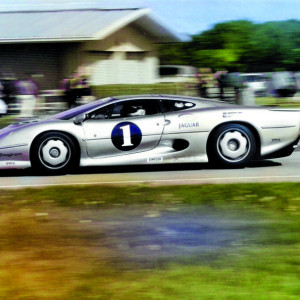The papers are wrong to compare pick-ups with tanks

 4 mins read11 January 2025
4 mins read11 January 2025
Have you ever seen footage of a Jaguar XJ220[1] racing series? I recommend it if you haven't. Called Fast Masters, it was run in 1993 in the US as a way of building the Jaguar[2] brand there - and, helpfully, it occupied some of Jaguar's supercars[3], which after the recession of the early 1990s weren't exactly leaping out of showrooms.
(Some people who ordered them, finding themselves suddenly cash-strapped, walked away from their deposits rather than buy the finished article.) Jaguar and broadcaster ESPN attracted mostly retired big-name drivers in the US and invited them to race in this one-make series. The XJ220 wasn't designed as a race car[4] and didn't seem to become much less of a handful when race-prepped.
The series was nicknamed Crash Masters and remains a great watch. It remained a single-line entry in my notes app throughout 2024, worthy of mention in a column but apparently not so worthy that I could big it up to 700 words of its own, so it sat there neglected. 
But, as ever, I'm keen to empty my notes for the new year, so here it is. See also a single-line entry: 'Paula Radcliffe Way', which is a bypass near Bedford named to celebrate the area's famous world-champion runner. Amazing to have something named after you, I'd have thought, notably when you're alive and can still enjoy it.
Most things named after people only get so once they've died. But I wonder: how does any celebrity in question feel about it if it's scruffy or neglected, as is likelier with a road than, say, a bridge or a race-track corner or a stadium? Would you feel hurt to see it strewn with fast-food packaging?
Would you organise a litter pick? Do you hate being contacted by phone but feel okay about texting or meeting in person? I'm told this is a thing that affects young people more and is looked down on.
But I wonder: is it actually reverting to humans' natural type? Once we could signal from afar or send written messages or meet in person, but the idea of meeting sort-of in person while still miles away from each other was an impossibility. Maybe phone calls or online meetings are now being shunned because actually they feel unnatural?
Anyway, I couldn't find a fit with cars, so I didn't manage to put this into a column. One notepad entry for which I did think of a car angle still needs more research. When Ineos[5] boss Sir Jim Ratcliffe took a stake in Manchester United FC, it was reported that he called people back into the office because fewer emails were sent on Fridays, when people worked at home.
That stat may be true, but it's incredibly simplistic if it happened as reported. It's possible that I write fewer emails when I'm not in the office, but it will be because I have several thousand words to write and people tapping me on the shoulder every 20 minutes isn't conducive to productivity. But I've thought - and this is why I need to bury my head in some stats - about how it relates to smart motorways.
Some proponents of them say they're the safest stretches of road in the country, despite how badly the public feels about them. What they don't say is how safe those stretches were beforehand and whether accident rates have gone up or down since. Smart motorways were designed to ease congestion, so it stands to reason that they were first introduced on the busiest (and therefore the slowest and probably safest per passenger mile) bits of road.
I will revisit this one, so it will stay in my notes app. On stats: the Sherman tank. Some media outlets think it's a winning argument to say pick-up trucks are a similar size to a Sherman.
It's not a winner. Truth is the Sherman was an incredibly compact tank, at just 5.8m long. The contemporary Churchill tank was 7.4m long and the modern Challenger tank is over 11m long.
While the Sherman could and did carry quite a lot, you couldn't put a pallet in the back of one. Cars are now too big, yes, but this is a silly stat. And with my notes largely clear, I feel better about stepping into 2025.
Happy new year.
 Title: Editor-at-largeFollow:
Title: Editor-at-largeFollow:

Matt is Autocar's lead features writer and presenter, is the main face of Autocar's YouTube channel, presents the My Week In Cars podcast and has written his weekly column, Tester's Notes, since 2013. Matt is an automotive engineer who has been writing and talking about cars since 1997. He joined Autocar in 2005 as deputy road test editor, prior to which he was road test editor and world rally editor for Channel 4's automotive website, 4Car.
Into all things engineering and automotive from any era, Matt is as comfortable regularly contributing to sibling titles Move Electric[6] and Classic & Sports Car[7] as he is writing for Autocar.
He has a racing licence, and some malfunctioning classic cars and motorbikes.
used cars for sale
Subscribe[8]
Never miss an issue of the world's oldest car magazine - subscribe to Autocar magazine today.Subscribe[9]Log in[10] or register[11] to post commentsReferences
- ^ Jaguar XJ220 (www.autocar.co.uk)
- ^ Jaguar (www.autocar.co.uk)
- ^ supercars (www.autocar.co.uk)
- ^ race car (www.autocar.co.uk)
- ^ Ineos (www.autocar.co.uk)
- ^ Move Electric (www.moveelectric.com)
- ^ Classic & Sports Car (www.classicandsportscar.com)
- ^ Subscribe (www.autocar.co.uk)
- ^ Subscribe (www.autocar.co.uk)
- ^ Log in (www.autocar.co.uk)
- ^ register (www.autocar.co.uk)